Human Biology (BIOL 160) - Written Assignment 1: Research Report
VerifiedAdded on 2022/08/21
|8
|2011
|12
Report
AI Summary
This report analyzes a research article examining the effect of music at 432 Hz on sleep quality and sleep latency in individuals with delayed sleep latency. The study, conducted at AIIMS, Patna, involved 25 healthy male participants who underwent sleep studies with and without music intervention. The report discusses the experimental design, including the use of a polysomnograph to record various sleep parameters. The independent variable was music, and the dependent variable was sleep. The results indicated positive effects of music on sleep cycle and electroencephalographic (EEG) results. The report also addresses the limitations of the study, such as the daytime nap setting and the exclusive male participant group, and discusses the relevance of the research in the context of global sleep problems. The study emphasizes music as a potential intervention for improving sleep and reducing related issues like stress and anxiety. The report concludes by highlighting the need for further research involving broader participant groups and nighttime studies.
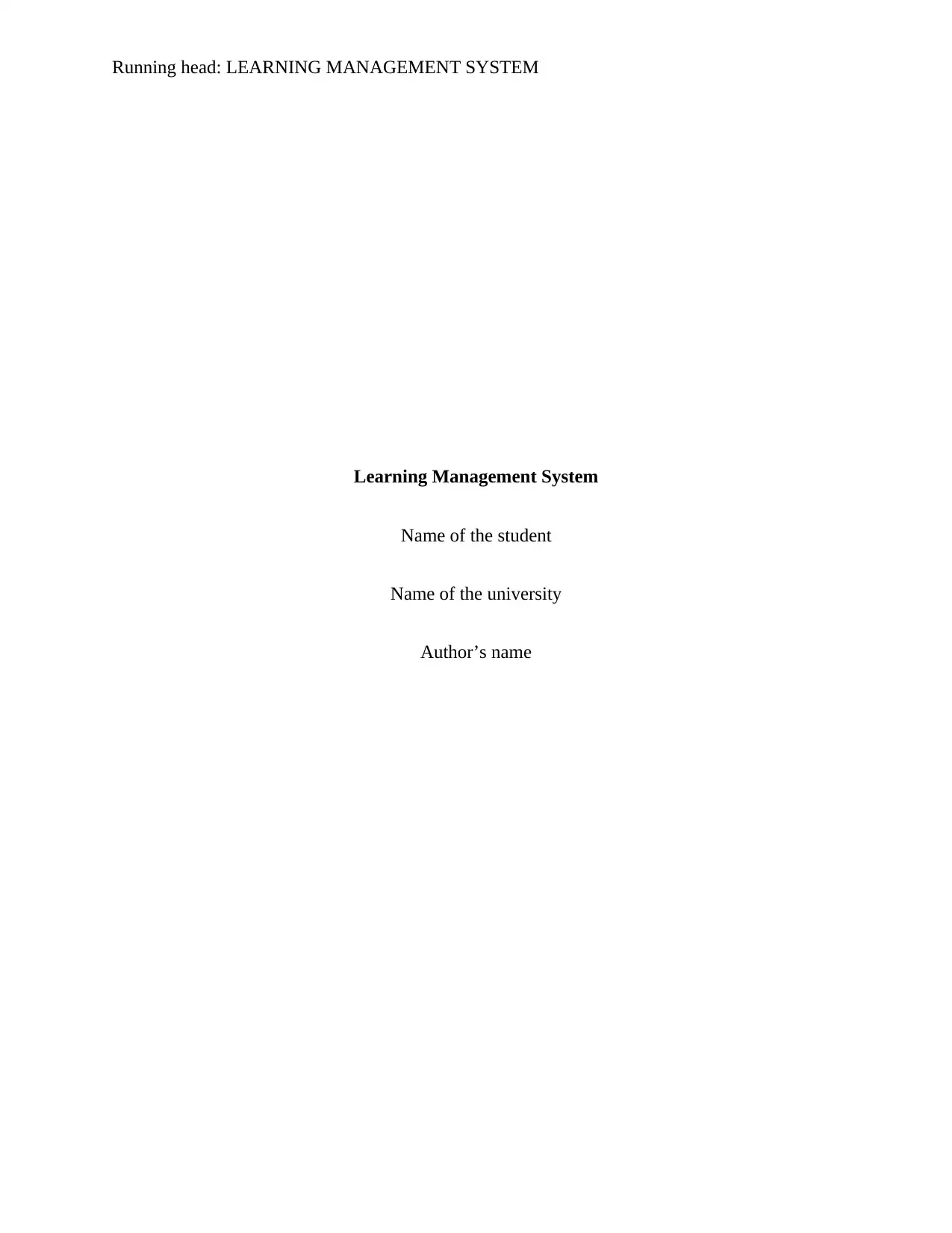
Running head: LEARNING MANAGEMENT SYSTEM
Learning Management System
Name of the student
Name of the university
Author’s name
Learning Management System
Name of the student
Name of the university
Author’s name
Paraphrase This Document
Need a fresh take? Get an instant paraphrase of this document with our AI Paraphraser
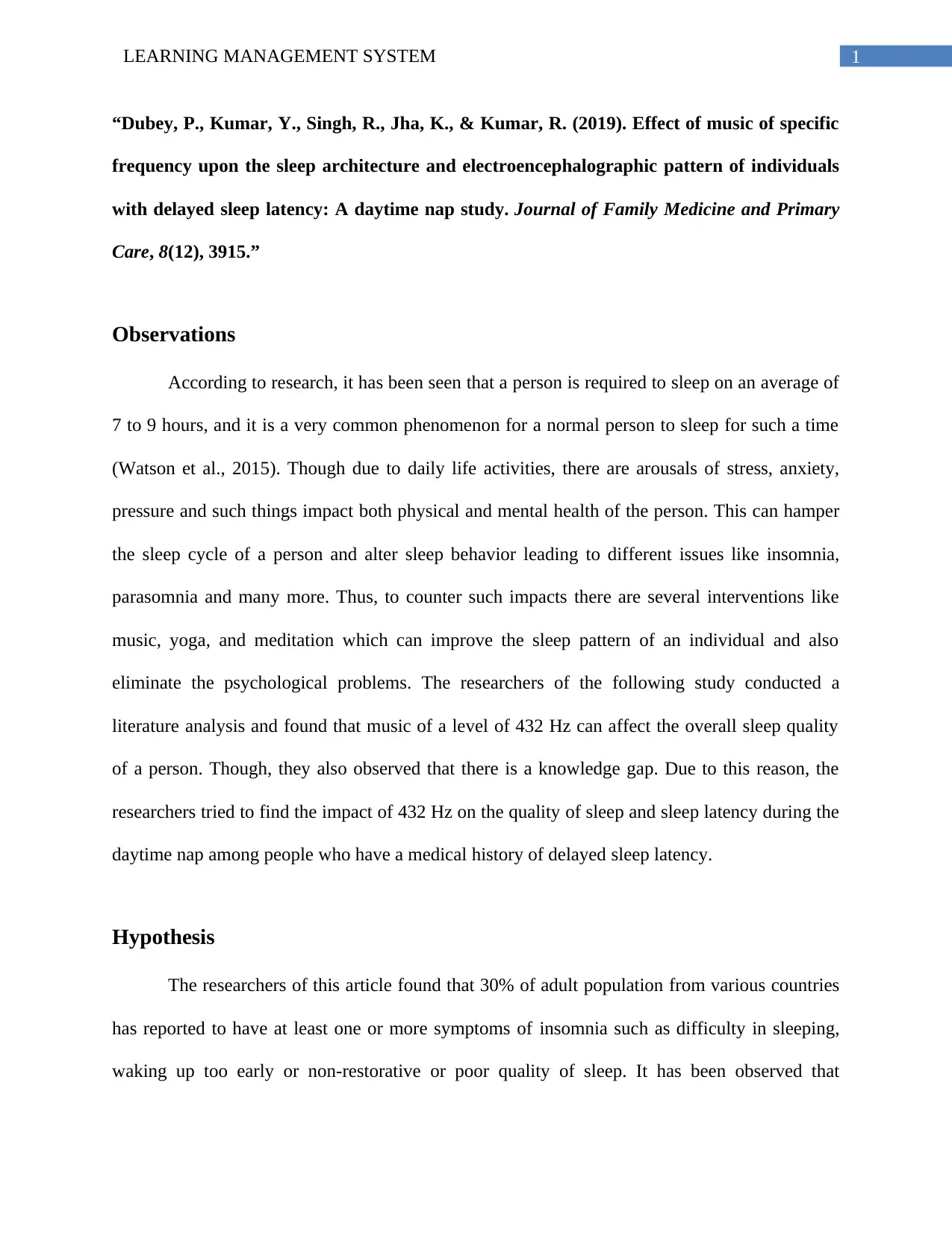
1LEARNING MANAGEMENT SYSTEM
“Dubey, P., Kumar, Y., Singh, R., Jha, K., & Kumar, R. (2019). Effect of music of specific
frequency upon the sleep architecture and electroencephalographic pattern of individuals
with delayed sleep latency: A daytime nap study. Journal of Family Medicine and Primary
Care, 8(12), 3915.”
Observations
According to research, it has been seen that a person is required to sleep on an average of
7 to 9 hours, and it is a very common phenomenon for a normal person to sleep for such a time
(Watson et al., 2015). Though due to daily life activities, there are arousals of stress, anxiety,
pressure and such things impact both physical and mental health of the person. This can hamper
the sleep cycle of a person and alter sleep behavior leading to different issues like insomnia,
parasomnia and many more. Thus, to counter such impacts there are several interventions like
music, yoga, and meditation which can improve the sleep pattern of an individual and also
eliminate the psychological problems. The researchers of the following study conducted a
literature analysis and found that music of a level of 432 Hz can affect the overall sleep quality
of a person. Though, they also observed that there is a knowledge gap. Due to this reason, the
researchers tried to find the impact of 432 Hz on the quality of sleep and sleep latency during the
daytime nap among people who have a medical history of delayed sleep latency.
Hypothesis
The researchers of this article found that 30% of adult population from various countries
has reported to have at least one or more symptoms of insomnia such as difficulty in sleeping,
waking up too early or non-restorative or poor quality of sleep. It has been observed that
“Dubey, P., Kumar, Y., Singh, R., Jha, K., & Kumar, R. (2019). Effect of music of specific
frequency upon the sleep architecture and electroencephalographic pattern of individuals
with delayed sleep latency: A daytime nap study. Journal of Family Medicine and Primary
Care, 8(12), 3915.”
Observations
According to research, it has been seen that a person is required to sleep on an average of
7 to 9 hours, and it is a very common phenomenon for a normal person to sleep for such a time
(Watson et al., 2015). Though due to daily life activities, there are arousals of stress, anxiety,
pressure and such things impact both physical and mental health of the person. This can hamper
the sleep cycle of a person and alter sleep behavior leading to different issues like insomnia,
parasomnia and many more. Thus, to counter such impacts there are several interventions like
music, yoga, and meditation which can improve the sleep pattern of an individual and also
eliminate the psychological problems. The researchers of the following study conducted a
literature analysis and found that music of a level of 432 Hz can affect the overall sleep quality
of a person. Though, they also observed that there is a knowledge gap. Due to this reason, the
researchers tried to find the impact of 432 Hz on the quality of sleep and sleep latency during the
daytime nap among people who have a medical history of delayed sleep latency.
Hypothesis
The researchers of this article found that 30% of adult population from various countries
has reported to have at least one or more symptoms of insomnia such as difficulty in sleeping,
waking up too early or non-restorative or poor quality of sleep. It has been observed that
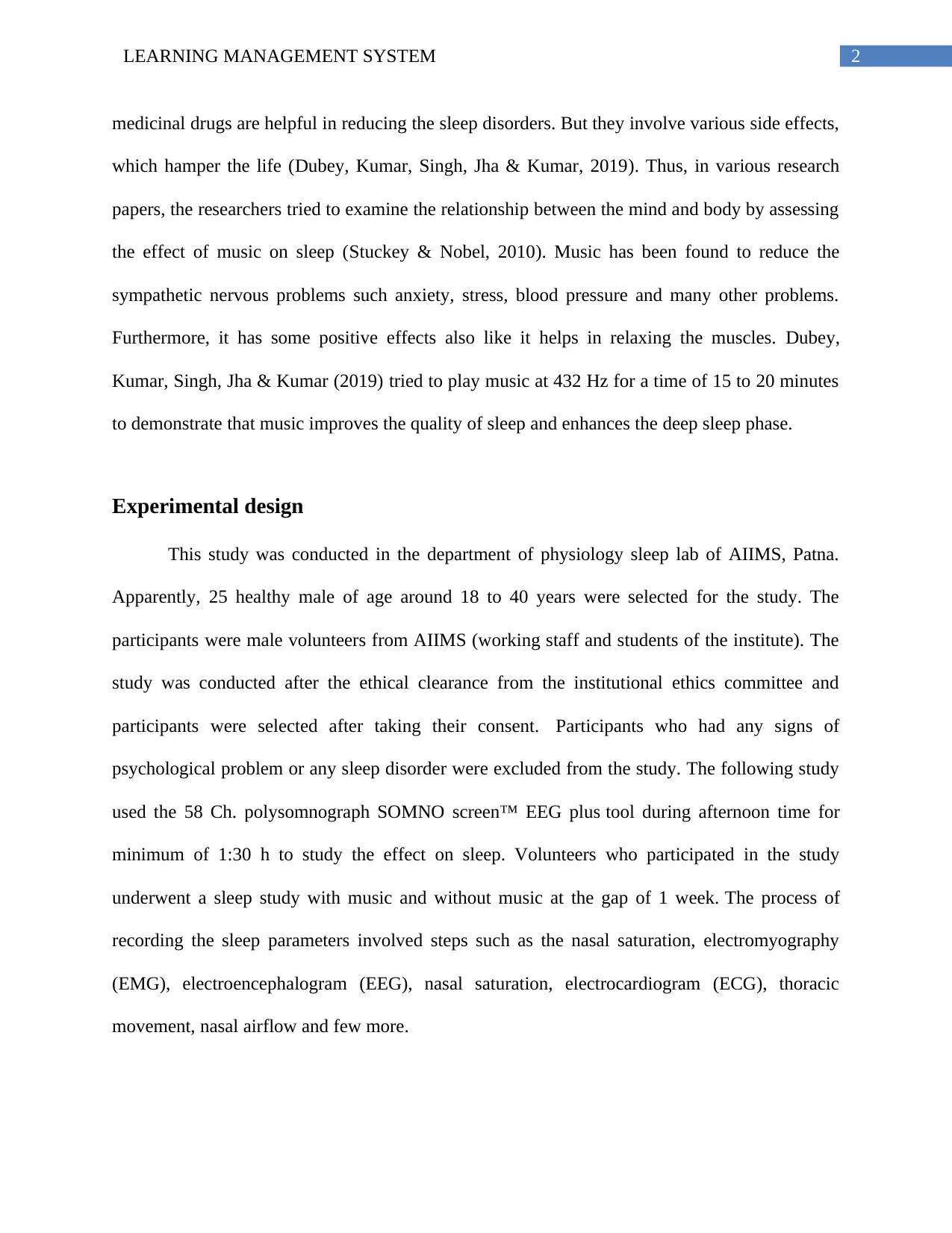
2LEARNING MANAGEMENT SYSTEM
medicinal drugs are helpful in reducing the sleep disorders. But they involve various side effects,
which hamper the life (Dubey, Kumar, Singh, Jha & Kumar, 2019). Thus, in various research
papers, the researchers tried to examine the relationship between the mind and body by assessing
the effect of music on sleep (Stuckey & Nobel, 2010). Music has been found to reduce the
sympathetic nervous problems such anxiety, stress, blood pressure and many other problems.
Furthermore, it has some positive effects also like it helps in relaxing the muscles. Dubey,
Kumar, Singh, Jha & Kumar (2019) tried to play music at 432 Hz for a time of 15 to 20 minutes
to demonstrate that music improves the quality of sleep and enhances the deep sleep phase.
Experimental design
This study was conducted in the department of physiology sleep lab of AIIMS, Patna.
Apparently, 25 healthy male of age around 18 to 40 years were selected for the study. The
participants were male volunteers from AIIMS (working staff and students of the institute). The
study was conducted after the ethical clearance from the institutional ethics committee and
participants were selected after taking their consent. Participants who had any signs of
psychological problem or any sleep disorder were excluded from the study. The following study
used the 58 Ch. polysomnograph SOMNO screen™ EEG plus tool during afternoon time for
minimum of 1:30 h to study the effect on sleep. Volunteers who participated in the study
underwent a sleep study with music and without music at the gap of 1 week. The process of
recording the sleep parameters involved steps such as the nasal saturation, electromyography
(EMG), electroencephalogram (EEG), nasal saturation, electrocardiogram (ECG), thoracic
movement, nasal airflow and few more.
medicinal drugs are helpful in reducing the sleep disorders. But they involve various side effects,
which hamper the life (Dubey, Kumar, Singh, Jha & Kumar, 2019). Thus, in various research
papers, the researchers tried to examine the relationship between the mind and body by assessing
the effect of music on sleep (Stuckey & Nobel, 2010). Music has been found to reduce the
sympathetic nervous problems such anxiety, stress, blood pressure and many other problems.
Furthermore, it has some positive effects also like it helps in relaxing the muscles. Dubey,
Kumar, Singh, Jha & Kumar (2019) tried to play music at 432 Hz for a time of 15 to 20 minutes
to demonstrate that music improves the quality of sleep and enhances the deep sleep phase.
Experimental design
This study was conducted in the department of physiology sleep lab of AIIMS, Patna.
Apparently, 25 healthy male of age around 18 to 40 years were selected for the study. The
participants were male volunteers from AIIMS (working staff and students of the institute). The
study was conducted after the ethical clearance from the institutional ethics committee and
participants were selected after taking their consent. Participants who had any signs of
psychological problem or any sleep disorder were excluded from the study. The following study
used the 58 Ch. polysomnograph SOMNO screen™ EEG plus tool during afternoon time for
minimum of 1:30 h to study the effect on sleep. Volunteers who participated in the study
underwent a sleep study with music and without music at the gap of 1 week. The process of
recording the sleep parameters involved steps such as the nasal saturation, electromyography
(EMG), electroencephalogram (EEG), nasal saturation, electrocardiogram (ECG), thoracic
movement, nasal airflow and few more.
⊘ This is a preview!⊘
Do you want full access?
Subscribe today to unlock all pages.

Trusted by 1+ million students worldwide
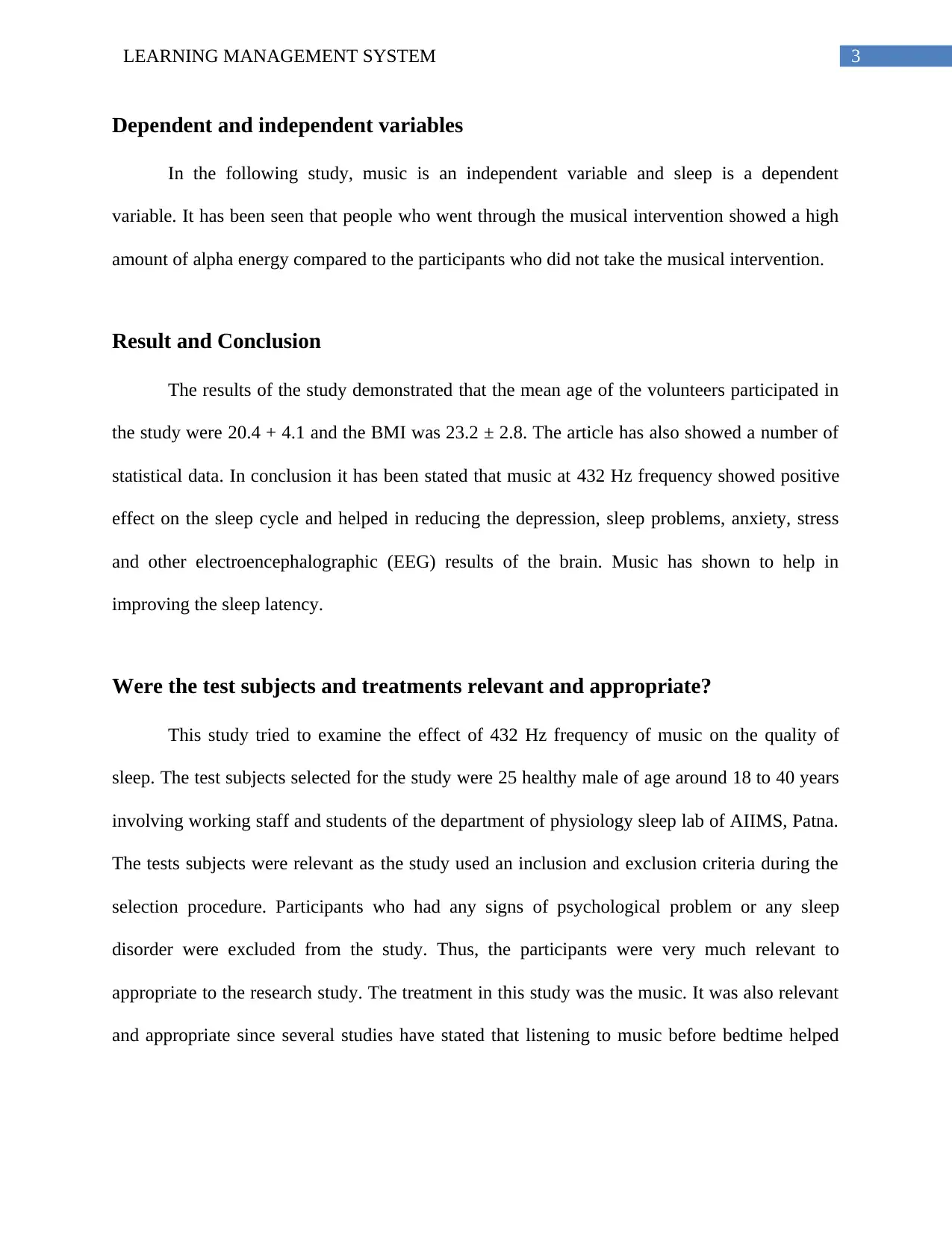
3LEARNING MANAGEMENT SYSTEM
Dependent and independent variables
In the following study, music is an independent variable and sleep is a dependent
variable. It has been seen that people who went through the musical intervention showed a high
amount of alpha energy compared to the participants who did not take the musical intervention.
Result and Conclusion
The results of the study demonstrated that the mean age of the volunteers participated in
the study were 20.4 + 4.1 and the BMI was 23.2 ± 2.8. The article has also showed a number of
statistical data. In conclusion it has been stated that music at 432 Hz frequency showed positive
effect on the sleep cycle and helped in reducing the depression, sleep problems, anxiety, stress
and other electroencephalographic (EEG) results of the brain. Music has shown to help in
improving the sleep latency.
Were the test subjects and treatments relevant and appropriate?
This study tried to examine the effect of 432 Hz frequency of music on the quality of
sleep. The test subjects selected for the study were 25 healthy male of age around 18 to 40 years
involving working staff and students of the department of physiology sleep lab of AIIMS, Patna.
The tests subjects were relevant as the study used an inclusion and exclusion criteria during the
selection procedure. Participants who had any signs of psychological problem or any sleep
disorder were excluded from the study. Thus, the participants were very much relevant to
appropriate to the research study. The treatment in this study was the music. It was also relevant
and appropriate since several studies have stated that listening to music before bedtime helped
Dependent and independent variables
In the following study, music is an independent variable and sleep is a dependent
variable. It has been seen that people who went through the musical intervention showed a high
amount of alpha energy compared to the participants who did not take the musical intervention.
Result and Conclusion
The results of the study demonstrated that the mean age of the volunteers participated in
the study were 20.4 + 4.1 and the BMI was 23.2 ± 2.8. The article has also showed a number of
statistical data. In conclusion it has been stated that music at 432 Hz frequency showed positive
effect on the sleep cycle and helped in reducing the depression, sleep problems, anxiety, stress
and other electroencephalographic (EEG) results of the brain. Music has shown to help in
improving the sleep latency.
Were the test subjects and treatments relevant and appropriate?
This study tried to examine the effect of 432 Hz frequency of music on the quality of
sleep. The test subjects selected for the study were 25 healthy male of age around 18 to 40 years
involving working staff and students of the department of physiology sleep lab of AIIMS, Patna.
The tests subjects were relevant as the study used an inclusion and exclusion criteria during the
selection procedure. Participants who had any signs of psychological problem or any sleep
disorder were excluded from the study. Thus, the participants were very much relevant to
appropriate to the research study. The treatment in this study was the music. It was also relevant
and appropriate since several studies have stated that listening to music before bedtime helped
Paraphrase This Document
Need a fresh take? Get an instant paraphrase of this document with our AI Paraphraser
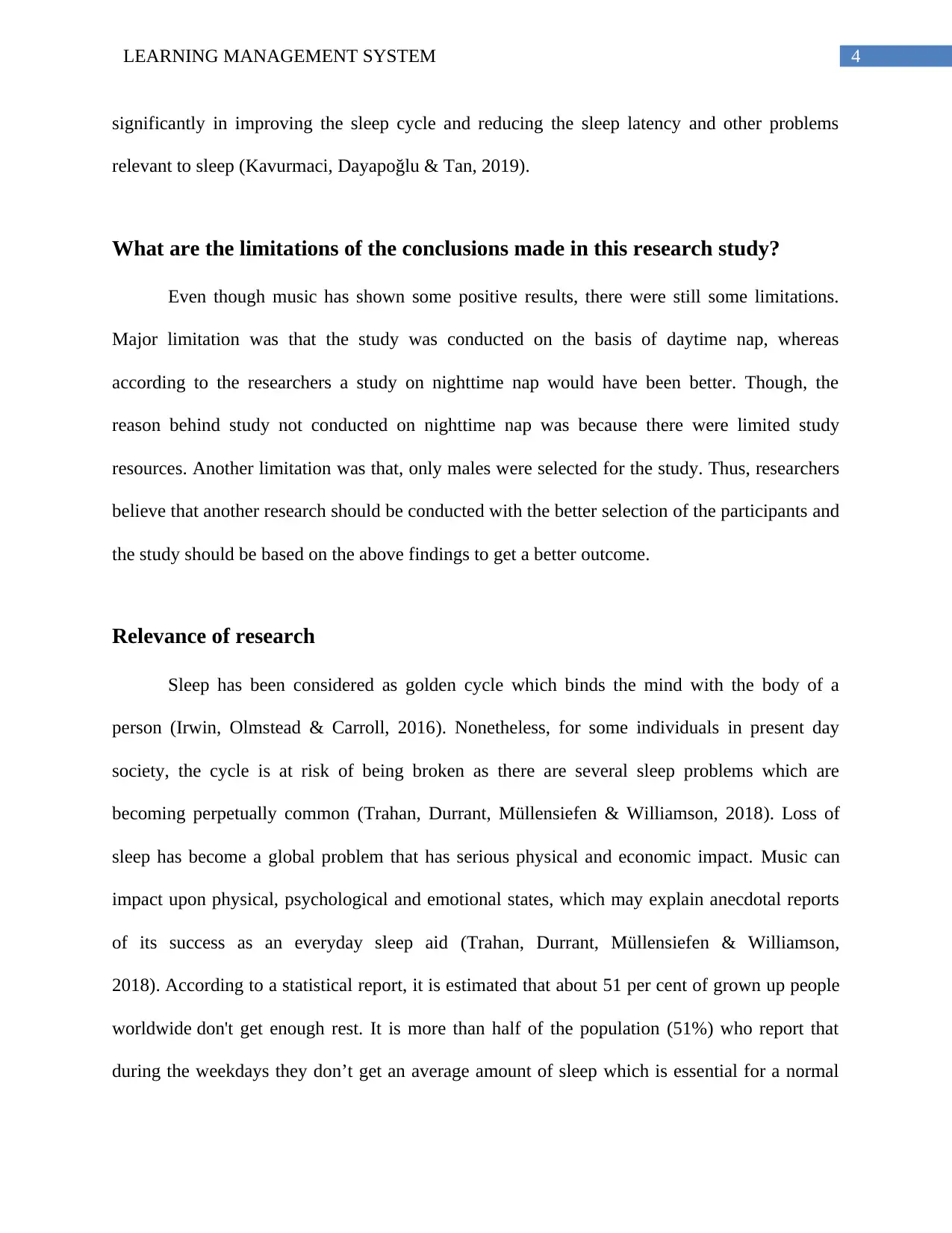
4LEARNING MANAGEMENT SYSTEM
significantly in improving the sleep cycle and reducing the sleep latency and other problems
relevant to sleep (Kavurmaci, Dayapoğlu & Tan, 2019).
What are the limitations of the conclusions made in this research study?
Even though music has shown some positive results, there were still some limitations.
Major limitation was that the study was conducted on the basis of daytime nap, whereas
according to the researchers a study on nighttime nap would have been better. Though, the
reason behind study not conducted on nighttime nap was because there were limited study
resources. Another limitation was that, only males were selected for the study. Thus, researchers
believe that another research should be conducted with the better selection of the participants and
the study should be based on the above findings to get a better outcome.
Relevance of research
Sleep has been considered as golden cycle which binds the mind with the body of a
person (Irwin, Olmstead & Carroll, 2016). Nonetheless, for some individuals in present day
society, the cycle is at risk of being broken as there are several sleep problems which are
becoming perpetually common (Trahan, Durrant, Müllensiefen & Williamson, 2018). Loss of
sleep has become a global problem that has serious physical and economic impact. Music can
impact upon physical, psychological and emotional states, which may explain anecdotal reports
of its success as an everyday sleep aid (Trahan, Durrant, Müllensiefen & Williamson,
2018). According to a statistical report, it is estimated that about 51 per cent of grown up people
worldwide don't get enough rest. It is more than half of the population (51%) who report that
during the weekdays they don’t get an average amount of sleep which is essential for a normal
significantly in improving the sleep cycle and reducing the sleep latency and other problems
relevant to sleep (Kavurmaci, Dayapoğlu & Tan, 2019).
What are the limitations of the conclusions made in this research study?
Even though music has shown some positive results, there were still some limitations.
Major limitation was that the study was conducted on the basis of daytime nap, whereas
according to the researchers a study on nighttime nap would have been better. Though, the
reason behind study not conducted on nighttime nap was because there were limited study
resources. Another limitation was that, only males were selected for the study. Thus, researchers
believe that another research should be conducted with the better selection of the participants and
the study should be based on the above findings to get a better outcome.
Relevance of research
Sleep has been considered as golden cycle which binds the mind with the body of a
person (Irwin, Olmstead & Carroll, 2016). Nonetheless, for some individuals in present day
society, the cycle is at risk of being broken as there are several sleep problems which are
becoming perpetually common (Trahan, Durrant, Müllensiefen & Williamson, 2018). Loss of
sleep has become a global problem that has serious physical and economic impact. Music can
impact upon physical, psychological and emotional states, which may explain anecdotal reports
of its success as an everyday sleep aid (Trahan, Durrant, Müllensiefen & Williamson,
2018). According to a statistical report, it is estimated that about 51 per cent of grown up people
worldwide don't get enough rest. It is more than half of the population (51%) who report that
during the weekdays they don’t get an average amount of sleep which is essential for a normal
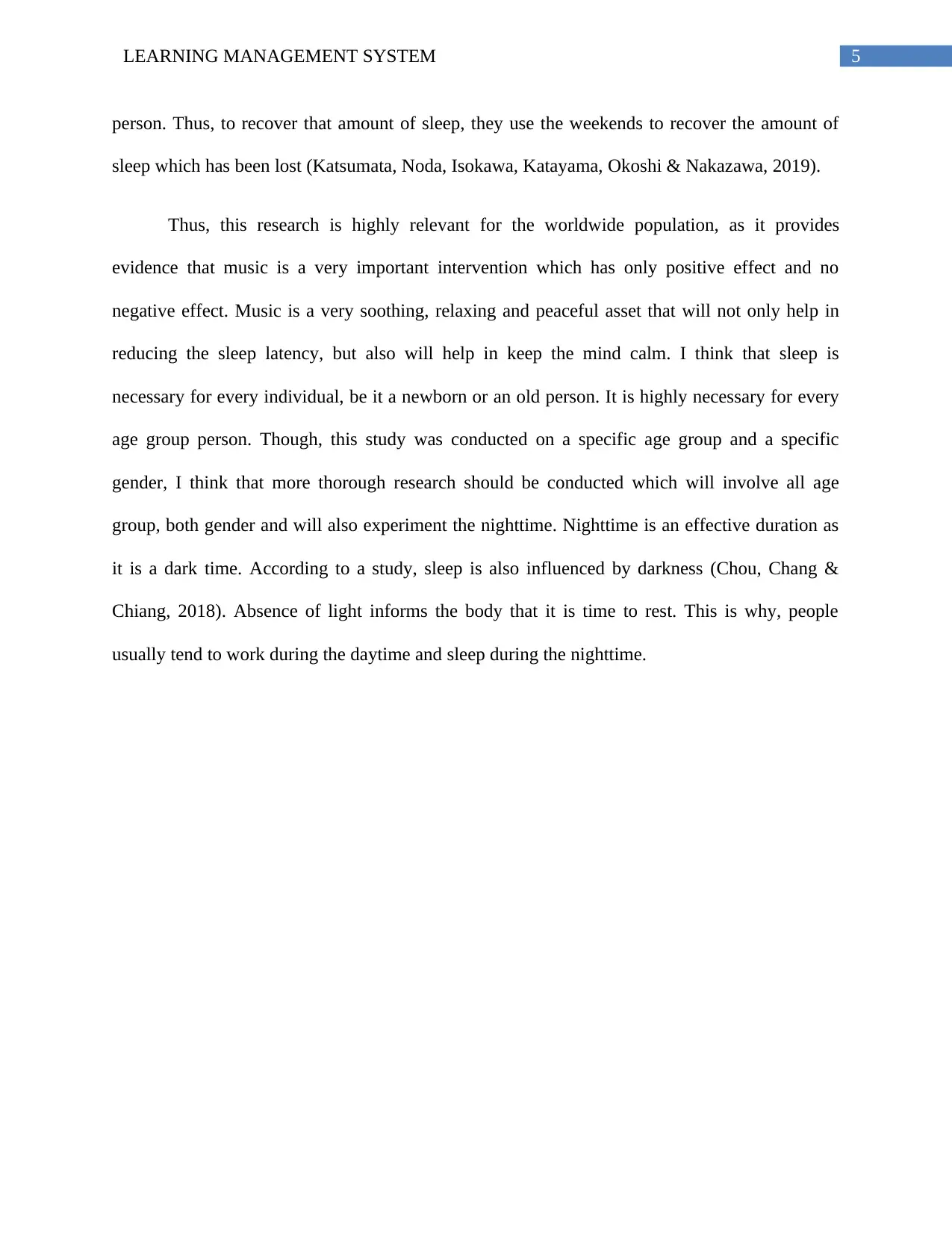
5LEARNING MANAGEMENT SYSTEM
person. Thus, to recover that amount of sleep, they use the weekends to recover the amount of
sleep which has been lost (Katsumata, Noda, Isokawa, Katayama, Okoshi & Nakazawa, 2019).
Thus, this research is highly relevant for the worldwide population, as it provides
evidence that music is a very important intervention which has only positive effect and no
negative effect. Music is a very soothing, relaxing and peaceful asset that will not only help in
reducing the sleep latency, but also will help in keep the mind calm. I think that sleep is
necessary for every individual, be it a newborn or an old person. It is highly necessary for every
age group person. Though, this study was conducted on a specific age group and a specific
gender, I think that more thorough research should be conducted which will involve all age
group, both gender and will also experiment the nighttime. Nighttime is an effective duration as
it is a dark time. According to a study, sleep is also influenced by darkness (Chou, Chang &
Chiang, 2018). Absence of light informs the body that it is time to rest. This is why, people
usually tend to work during the daytime and sleep during the nighttime.
person. Thus, to recover that amount of sleep, they use the weekends to recover the amount of
sleep which has been lost (Katsumata, Noda, Isokawa, Katayama, Okoshi & Nakazawa, 2019).
Thus, this research is highly relevant for the worldwide population, as it provides
evidence that music is a very important intervention which has only positive effect and no
negative effect. Music is a very soothing, relaxing and peaceful asset that will not only help in
reducing the sleep latency, but also will help in keep the mind calm. I think that sleep is
necessary for every individual, be it a newborn or an old person. It is highly necessary for every
age group person. Though, this study was conducted on a specific age group and a specific
gender, I think that more thorough research should be conducted which will involve all age
group, both gender and will also experiment the nighttime. Nighttime is an effective duration as
it is a dark time. According to a study, sleep is also influenced by darkness (Chou, Chang &
Chiang, 2018). Absence of light informs the body that it is time to rest. This is why, people
usually tend to work during the daytime and sleep during the nighttime.
⊘ This is a preview!⊘
Do you want full access?
Subscribe today to unlock all pages.

Trusted by 1+ million students worldwide
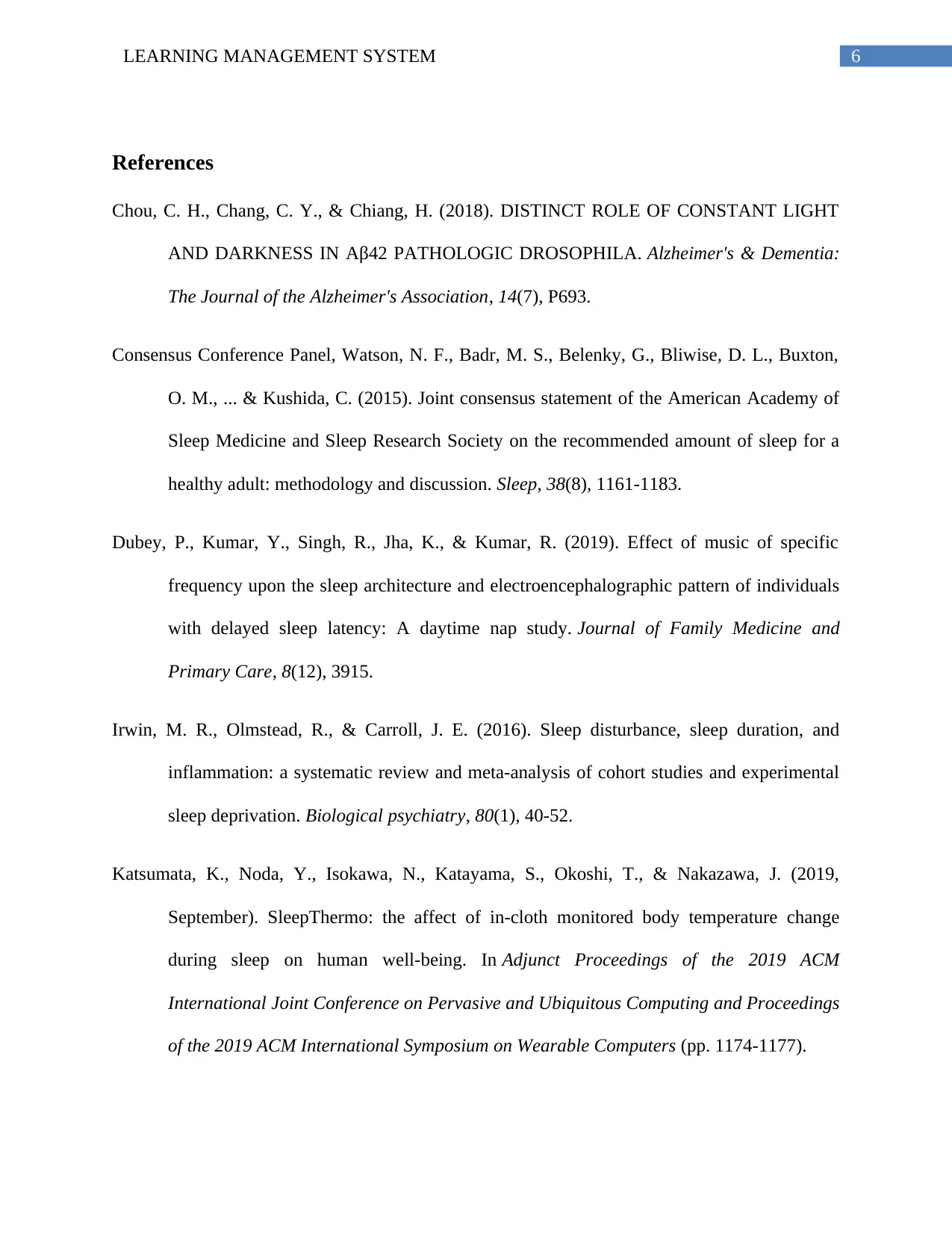
6LEARNING MANAGEMENT SYSTEM
References
Chou, C. H., Chang, C. Y., & Chiang, H. (2018). DISTINCT ROLE OF CONSTANT LIGHT
AND DARKNESS IN Aβ42 PATHOLOGIC DROSOPHILA. Alzheimer's & Dementia:
The Journal of the Alzheimer's Association, 14(7), P693.
Consensus Conference Panel, Watson, N. F., Badr, M. S., Belenky, G., Bliwise, D. L., Buxton,
O. M., ... & Kushida, C. (2015). Joint consensus statement of the American Academy of
Sleep Medicine and Sleep Research Society on the recommended amount of sleep for a
healthy adult: methodology and discussion. Sleep, 38(8), 1161-1183.
Dubey, P., Kumar, Y., Singh, R., Jha, K., & Kumar, R. (2019). Effect of music of specific
frequency upon the sleep architecture and electroencephalographic pattern of individuals
with delayed sleep latency: A daytime nap study. Journal of Family Medicine and
Primary Care, 8(12), 3915.
Irwin, M. R., Olmstead, R., & Carroll, J. E. (2016). Sleep disturbance, sleep duration, and
inflammation: a systematic review and meta-analysis of cohort studies and experimental
sleep deprivation. Biological psychiatry, 80(1), 40-52.
Katsumata, K., Noda, Y., Isokawa, N., Katayama, S., Okoshi, T., & Nakazawa, J. (2019,
September). SleepThermo: the affect of in-cloth monitored body temperature change
during sleep on human well-being. In Adjunct Proceedings of the 2019 ACM
International Joint Conference on Pervasive and Ubiquitous Computing and Proceedings
of the 2019 ACM International Symposium on Wearable Computers (pp. 1174-1177).
References
Chou, C. H., Chang, C. Y., & Chiang, H. (2018). DISTINCT ROLE OF CONSTANT LIGHT
AND DARKNESS IN Aβ42 PATHOLOGIC DROSOPHILA. Alzheimer's & Dementia:
The Journal of the Alzheimer's Association, 14(7), P693.
Consensus Conference Panel, Watson, N. F., Badr, M. S., Belenky, G., Bliwise, D. L., Buxton,
O. M., ... & Kushida, C. (2015). Joint consensus statement of the American Academy of
Sleep Medicine and Sleep Research Society on the recommended amount of sleep for a
healthy adult: methodology and discussion. Sleep, 38(8), 1161-1183.
Dubey, P., Kumar, Y., Singh, R., Jha, K., & Kumar, R. (2019). Effect of music of specific
frequency upon the sleep architecture and electroencephalographic pattern of individuals
with delayed sleep latency: A daytime nap study. Journal of Family Medicine and
Primary Care, 8(12), 3915.
Irwin, M. R., Olmstead, R., & Carroll, J. E. (2016). Sleep disturbance, sleep duration, and
inflammation: a systematic review and meta-analysis of cohort studies and experimental
sleep deprivation. Biological psychiatry, 80(1), 40-52.
Katsumata, K., Noda, Y., Isokawa, N., Katayama, S., Okoshi, T., & Nakazawa, J. (2019,
September). SleepThermo: the affect of in-cloth monitored body temperature change
during sleep on human well-being. In Adjunct Proceedings of the 2019 ACM
International Joint Conference on Pervasive and Ubiquitous Computing and Proceedings
of the 2019 ACM International Symposium on Wearable Computers (pp. 1174-1177).
Paraphrase This Document
Need a fresh take? Get an instant paraphrase of this document with our AI Paraphraser
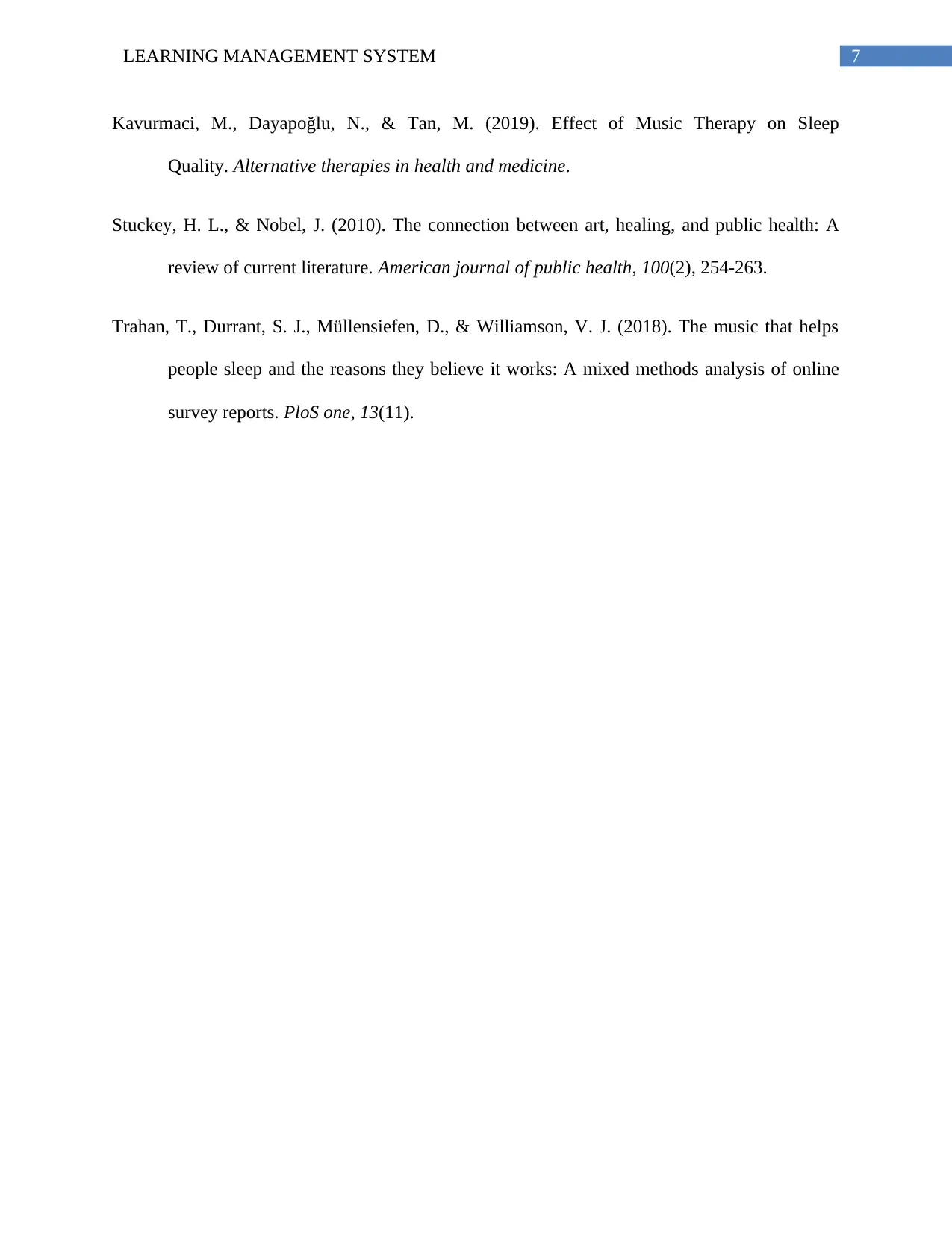
7LEARNING MANAGEMENT SYSTEM
Kavurmaci, M., Dayapoğlu, N., & Tan, M. (2019). Effect of Music Therapy on Sleep
Quality. Alternative therapies in health and medicine.
Stuckey, H. L., & Nobel, J. (2010). The connection between art, healing, and public health: A
review of current literature. American journal of public health, 100(2), 254-263.
Trahan, T., Durrant, S. J., Müllensiefen, D., & Williamson, V. J. (2018). The music that helps
people sleep and the reasons they believe it works: A mixed methods analysis of online
survey reports. PloS one, 13(11).
Kavurmaci, M., Dayapoğlu, N., & Tan, M. (2019). Effect of Music Therapy on Sleep
Quality. Alternative therapies in health and medicine.
Stuckey, H. L., & Nobel, J. (2010). The connection between art, healing, and public health: A
review of current literature. American journal of public health, 100(2), 254-263.
Trahan, T., Durrant, S. J., Müllensiefen, D., & Williamson, V. J. (2018). The music that helps
people sleep and the reasons they believe it works: A mixed methods analysis of online
survey reports. PloS one, 13(11).
1 out of 8
Your All-in-One AI-Powered Toolkit for Academic Success.
+13062052269
info@desklib.com
Available 24*7 on WhatsApp / Email
![[object Object]](/_next/static/media/star-bottom.7253800d.svg)
Unlock your academic potential
Copyright © 2020–2026 A2Z Services. All Rights Reserved. Developed and managed by ZUCOL.